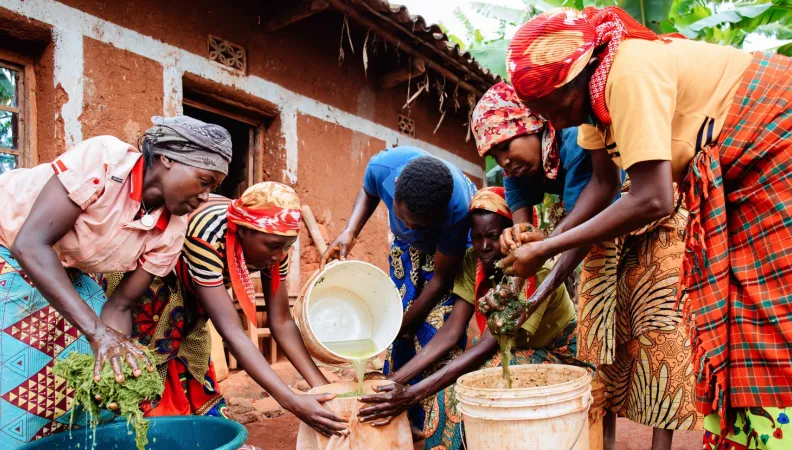Share the page
6 Things to Know about Civil Society Organizations and AFD
Published on

Civil society organizations (CSOs) act as mediators between public authorities and communities. This empowers them to push forward social action and support sustainable and inclusive development pathways. For 15 years, AFD has built partnerships with a variety of CSOs. We take a look at some of the key aspects of these relations – some of which may surprise you!
AFD plays a key role in financing civil society organizations
In the changing landscape experienced by some civil society organizations (CSOs), AFD has been a valued donor through its understanding of the interest of supporting a variety of stakeholders. For example, it has helped the largest organizations ramp up their activities, while fostering the emergence of new actors, especially in the social and solidarity economy (SSE). It has also encouraged grassroots movements in the field of international solidarity, as well as the development of support structures in the non-profit sector.
AFD’s financing for CSOs rose from €12 million in 2007 to €465 million in 2022, making it a key funder of French civil society. More generally, CSOs have become leading actors in the implementation of projects, giving AFD a greater understanding of the situation in certain areas of operation.
They have also helped AFD build local partnerships and deploy activities closely linked towards the needs of the beneficiaries. The share of grants distributed to CSOs by AFD also rose from 24% to 38% over the same period, mainly in the agriculture, health and education sectors.
What is a CSO?
Civil society organizations (CSOs) include non-governmental organizations (NGOs), foundations (public and private), professional associations, unions, and cooperatives. Their mission is to carry out social action and serve the general interest by maintaining a dialogue with both citizens and public authorities. For example, they can support women victims of violence, assist children in difficulty through cultural and sports programs, or train smallholder farmers in agroecology.
Further reading: Confronting Gender-based Violence in Rwanda and Reigniting Hope for the Future
Financed CSOs have very diverse profiles
In 15 years, AFD has financed nearly 500 different CSOs, with a gradual shift towards increasing the number of CSOs supported. There has been a substantial change in their profiles, with a trend towards the larger organizations in recent years.
Small and medium-sized CSOs receive financing from AFD’s operational divisions, through the grants reallocated to them by the largest CSOs, as well as through the development of consortium-based approaches and the growing number of intermediated funds.
Not just abroad!
AFD finances Education for Citizenship and International Solidarity (ECIS) projects, because CSOs have expertise and know-how in raising awareness through their presence on the ground and the links they often have with communities. Furthermore, AFD helps the non-profit sector build networks and thereby strengthen its capacity. This involves helping CSOs become more professional, improve the quality of their projects on the ground, and join forces to make their voice heard both in France and at international level. For example, AFD supports the Coordination Sud platform, which includes 185 NGOs and plays an advocacy role in supporting development policies.
AFD also supports platforms, networks and coalitions, such as the Forum of Migrant International Solidarity Organizations (FORIM), the Center for Research Innovation and Development (CRID), the Water Solidarity Program, the Agriculture and Food Commission (C2A), the Education Coalition, and the Euromed France Network (REF).
AFD also finances “small” projects led by local actors
Local CSOs have accounted for more than one third of AFD’s new partners since 2018. AFD can directly finance local CSOs when they have the capacity to manage large-scale projects. They can also carry out projects in consortium with French or international CSOs.
Small local CSOs can benefit from funds as partners of French CSOs, and there’s an increasing number of mechanisms for the redistribution of funds, which indirectly reach local CSOs. Intermediated funds thus enable AFD to finance a large CSO, which can in turn allocate smaller amounts of financing to small local CSOs.
Further reading: Using Sports for Children to Learn Lifelong Lessons of Reconciliation in Kosovo
AFD respects the right of initiative of CSOs
The CSO Initiatives Fund set up in 2009 was the main financing channel until 2022, but today, the CSO Initiatives Fund accounts for a third of the financing allocated to CSOs – and the budget is constantly growing. Through this approach, the partnership between civil society and public authorities is based not so much on “service provision”, as on a partnership that recognizes the value of the competences, expertise and strengths of CSOs, as well as their creativity and capacity for innovation.
Find out more about AFD and CSOs
The expertise and input of CSOs also helps AFD develop
Over these 15 years, the “CSO culture” has been instilled at AFD. This involves strengthening the partnership dynamic, and building a better understanding of CSOs’ working methods, guiding principles, and their added value. For example, there are many spaces for dialogue at the sectoral level. They can serve as a platform for exchanges of expertise and information, one example being the annual accountability workshop for water and sanitation, and the working group on agroecological transitions. Such dialogues help develop a common culture between AFD and CSOs.
